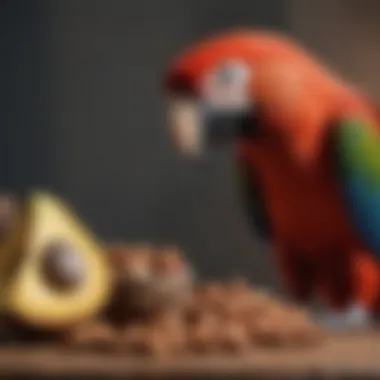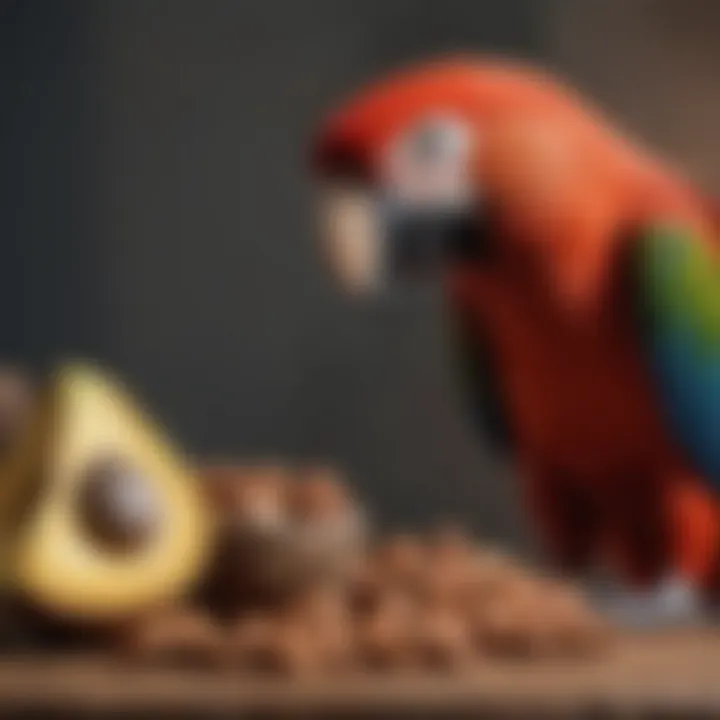Understanding the Dietary Needs of Macaws


Intro
In this article, we emphasize the importance of diversity in their meals, as a varied diet mimics their natural habitat and enhances their physical and mental health. Each subsection will delve into different aspects of macaw care, including nutritional guides, health considerations, and enriching activities. By ensuring the right dietary practices, bird owners can foster a thriving environment for their feathered companions.
Prelude to Macaw Diet
A thorough understanding of the dietary needs of macaws is crucial for their well-being and longevity. As intelligent and social creatures, macaws require a diet that mimics their natural food sources while providing the nutritional components essential for their health. This section aims to highlight the key elements of macaw diets that pet owners should consider, including species-specific requirements and the implications of dietary choices on their health.
The Importance of Diet
Diet plays a significant role in the overall health of macaws. A balanced diet ensures that these birds receive the necessary vitamins, minerals, and other nutrients, promoting not just physical well-being but also mental stimulation. Macaws in the wild consume a diverse range of foods that contribute to their health. When in captivity, it is essential to replicate this diversity to avoid nutritional deficiencies, which can lead to serious health problems such as feather plucking or obesity. Moreover, the right diet influences behavior, energy levels, and even the lifespan of macaws.
Understanding Macaw Species
Different species of macaws have unique dietary needs influenced by their natural habitats and feeding behaviors. For instance, the Blue-and-yellow macaw predominantly eats fruits and nuts found in its South American forest habitat, while Scarlet macaws may prefer seeds and berries. Green-winged macaws, known for their larger size, require a more substantial diet, which includes a variety of fruits and high-fat nuts.
Understanding the specific dietary habits of each species helps bird owners provide tailored nutrition that meets their pet's specific requirements. Additionally, recognizing these differences cultivates better feeding practices and food selection that supports the health and happiness of each macaw.
"A varied diet is the cornerstone of a macaw's health, influencing not just their physical conditions but also their behavior and emotional state."
Natural Habitat and Food Sources
Understanding the natural habitat and food sources of macaws is crucial for recognize their dietary needs. Macaws are native to Central and South America and inhabit a variety of environments, including tropical rainforests, savannas, and woodlands. The availability of food in these regions directly influences their nutritional needs and behaviors. When kept in captivity, mimicking their natural feeding habits can support their health and well-being. Hence, knowing what foods macaws typically consume in the wild helps bird owners make informed decisions about their diets.
Geographical Distribution
Macaws are found in various geographical regions from Mexico to the Amazon Basin. Different species thrive in specific areas related to climate and vegetation. For instance, the Blue-and-yellow Macaw primarily resides in the northern part of South America, while the Scarlet Macaw is more common in the humid tropical forests of Central America. This distribution affects the types of natural food sources available to them, greatly impacting their dietary requirements. It is important for bird owners to recognize these geographical factors to understand their pet's needs better.
Common Natural Foods
Macaws consume a diverse array of foods in their natural habitats. This diversity ensures they receive a wide range of nutrients necessary for their health. Here are the primary food sources:
Fruits
Fruits are a vital part of a macaw's diet. They provide essential vitamins and antioxidants that boost immune function. Fruits like mangoes, papayas, and bananas are favored due to their high sugar content, which gives macaws energy. However, while fruits are nutritious, they should be offered in moderation to prevent obesity and other health issues. The unique moisture content also aids in hydration, which is beneficial in captivity.
Nuts
Nuts are another key component of a macaw's natural diet. They are an excellent source of fats and proteins. Species like the Green-winged Macaw enjoy nuts such as almonds and walnuts. Nuts are energy-dense, making them highly attractive to macaws. However, their caloric richness necessitates balanced portion control. Offering a variety of nuts ensures that macaws receive different nutrients. This diversity may enhance their overall health.
Seeds
Seeds are a staple food source, contributing to the protein and fat content of a macaw's diet. Common seeds include sunflower and pumpkin seeds. They provide energy but are not as nutritionally complete as fruits and nuts. It's essential to offer seeds as part of a balanced diet rather than the primary food source, as over-reliance can lead to deficiencies.
Leafy Greens
Leafy greens are often overlooked but offer vital nutrients to macaws. Greens like kale, spinach, and dandelion greens provide minerals and fiber. They help maintain digestive health and provide necessary hydration. The high fiber content in leafy greens is essential to prevent gastrointestinal issues in birds kept in captivity. Therefore, including a variety of greens supports a balanced diet.
Nutritional Components
Nutritional components play a critical role in the overall health and well-being of macaws. Macaws require a carefully balanced diet that includes essential nutrients to meet their physiological needs. These components directly affect their growth, reproduction, and immune system, impacting their longevity and quality of life. Understanding these nutritional requirements is essential for bird owners who want to provide optimal care.
Essential Nutrients
Vitamins
Vitamins are crucial for macaw health, serving various functions vital for body processes. They support the immune system, improve vision, and promote healthy skin and feathers. One key characteristic of vitamins is their role as antioxidants, which protect the body's cells from damage. For macaws, specific vitamins like A, D3, and E are vital, as they facilitate growth and reproductive health.
Vitamins can be found in fresh fruits and vegetables, such as carrots for vitamin A and spinach for vitamin K. However, they can degrade over time, particularly in processed foods. The unique feature of vitamins is their ability to support many bodily functions simultaneously, making them a fundamental part of a macaw's diet. It is important for bird owners to ensure their macaws receive a varied diet to prevent deficiencies that could lead to serious health problems.
Minerals
Minerals contribute significantly to macaw's bone health, metabolism, and enzyme function. Calcium and phosphorus are particularly important, as they strengthen bones and help in the reproductive process. A key characteristic of minerals is that many of them are not produced by the body and must be ingested through diet. For this reason, it is a beneficial aspect of a macaw's diet to include mineral-rich foods such as leafy greens, nuts, and fortified pellets.
One unique feature of minerals is their role in enzymatic reactions, facilitating numerous biochemical processes necessary for health. However, an excess of certain minerals can lead to toxicity, emphasizing the need for careful management of diet among macaw owners.
Proteins


Proteins are the building blocks of macaw tissue and play a crucial role in muscle development and overall growth. They are comprised of amino acids, some of which are essential and must come from the diet. The key characteristic of proteins is their role in repairing tissues and producing enzymes and hormones.
Macaws benefit from sources of quality protein, such as legumes, nuts, and cooked chicken. The unique feature of proteins is their ability to provide a steady release of energy throughout the day, supporting the active lifestyle of macaws. It is important to balance protein intake, as too much protein can lead to health issues, such as liver problems.
Dietary Fiber and Its Role
Dietary fiber is another important aspect of a macaw's nutrition. Although fiber does not provide direct energy, it plays a vital role in digestion. A diet high in fiber helps maintain a healthy gut and prevent constipation, which is especially important for macaws with their unique digestive systems.
Additionally, fiber supports the overall well-being of macaws by facilitating better nutrient absorption. Owners should prioritize including high-fiber foods such as vegetables, fruits, and whole grains to ensure their birds receive an adequate amount. Proper attention to fiber can significantly enhance the overall dietary health of macaws.
Food Variations for Macaws
Understanding food variations for macaws is essential for their longevity and overall health. Macaws are not only vibrant and intelligent birds but also require diverse diets to fulfill their nutritional needs. A varied diet is crucial in preventing nutritional deficiencies and keeping the bird's immune system robust. Several factors play a part in determining the optimal diet for macaws, including species, age, and lifestyle. Without adequate variety, macaws may face health issues like obesity, feather plucking, or even illnesses related to vitamin deficiencies.
Dietary Needs by Species
Blue-and-yellow Macaws
Blue-and-yellow macaws are noted for their striking coloration and sociable nature. Their diet mainly consists of fruits, nuts, and seeds in their natural habitat. In captivity, it is important to provide a balanced diet that includes high-quality pellets complemented by fresh fruits and vegetables. This macaw species requires higher fat content in its diet compared to others, particularly from nuts. One unique feature of blue-and-yellow macaws is their strong beaks, which allow them to crack open hard nuts with ease. Ensuring a variety of nuts in their diet will promote their dental health and natural foraging behavior.
Scarlet Macaws
Scarlet macaws are perhaps the most visually stunning among the macaw species. They are known for their vibrant red, yellow, and blue feathers. Scarlets are particularly sensitive to changes in diet, making their nutritional management vital. Their diet should consist of a mix of fruits, veggies, and quality seed or pellet formulations. A unique aspect of scarlet macaws is their higher sensitivity to sugar, so offering too many sugary fruits can lead to health complications. This attention to dietary composition helps in maintaining their overall well-being and prevents potential obesity issues.
Green-winged Macaws
Green-winged macaws have an impressive wingspan and are known for their sociable nature. Their diet must be rich in protein and fat, similar to their blue-and-yellow counterparts. In captivity, they thrive on a mix of pellets and a variety of fresh produce. One key characteristic of green-winged macaws is their preference for larger-sized foods; thus, offering larger pieces of fruits and vegetables encourages their natural eating habits. However, too much fat can lead to obesity, and caregivers must monitor their portions closely. This makes it necessary to offer ample opportunities for physical activities as part of their care.
Age-Related Dietary Adjustments
Juvenile Diet
The juvenile diet is critical for the proper growth and development of young macaws. Young birds require more protein and specific vitamins to support their rapid growth. In this phase, caregivers should focus on soft, easy-to-eat foods that are nutrient-dense. Fresh fruits and vegetables should be introduced gradually to help develop their taste preferences. This adjustment ensures they transition to a varied diet as they mature.
Adult Diet
As macaws reach adulthood, dietary requirements begin to stabilize. Adult diets should provide balanced nutrients, focusing on maintaining a healthy weight and preventing health issues. Quality pellets should form the basis of their diet, supplemented with fresh produce. Regular monitoring of their weight is essential, as adult macaws can easily become overweight if their dietary needs are not met properly.
Senior Diet
Senior macaws have distinct dietary needs that reflect their aging bodies. Senior diets often require lower fat content and more fiber to support digestive health. This transition can include softer foods or specialized senior pellets. Providing a mix of easy-to-chew fruits and vegetables can help cater to their potential dental issues. Caregivers must observe and adjust food offerings, addressing individual health concerns such as arthritis or other age-related issues.
A well-balanced diet across all life stages of macaws is vital to ensure their longevity and health – tailored adjustments are key in every phase of their lives.
Commercial Food Options
Commercial food options play a crucial role in the diets of macaws, particularly for those kept as pets. The convenience and specialized nutrition these products offer can greatly benefit the overall health of macaws in captivity. It is essential for bird owners to understand the various types of commercial foods available, as well as their specific advantages and disadvantages.
Pellets vs. Seeds
When considering commercial food for macaws, a common debate arises between pellets and seeds. Pellets are designed to provide a balanced diet, ensuring that essential nutrients are met in a single scoop. They often contain a combination of vitamins, minerals, and proteins crucial for a macaw’s health. Conversely, seeds offer a more scattered approach to nutrition. While seeds are palatable and enjoyed by macaws, they often lack the necessary vitamins and minerals and can lead to imbalanced diets if given exclusively.
- Benefits of Pellets:
- Disadvantages of Seeds:
- Balanced Nutrition
- Reduces waste due to selective eating
- Easier to measure portions
- Higher in fat
- Limited nutrient profile
- Potential for picky eating habits
In general, relying too heavily on seeds can lead to health issues such as obesity and malnutrition. Therefore, it is advisable for bird owners to incorporate pellets as a primary dietary component.
Understanding Label Ingredients
Another important aspect of commercial food is the understanding of label ingredients. Not all brands and products are equal. Many pet owners may overlook the ingredient list, but this can be instrumental in understanding what is actually going into their bird’s diet.
Some key terms to look for include:
- Whole Foods: Ingredients that are less processed and closer to their natural state.
- Specific Ingredients: Look for real fruit, nuts, and vegetables rather than generic terms like "natural flavors" or "animal by-products."
- No Fillers: Many lower-quality bird foods may use fillers such as corn or wheat that provide little nutritional value.


Key Point: High-quality commercial food will list identifiable ingredients that contribute to a balanced diet.
Supplemental Foods
While commercial diets provide convenience and balance, supplemental foods are significant in adding variety and enhancing a macaw's overall diet. These foods can include fresh fruits, vegetables, and some nuts, providing more natural flavors and textures that keep macaws engaged while dining.
- Fresh Fruits: Offer options like apples, bananas, mangoes, and berries in moderation.
- Vegetables: Leafy greens such as kale and spinach can be nutritious supplements.
- Nuts: Introduce almonds, walnuts, or hazelnuts, ensuring they are unsalted and unprocessed.
Using supplemental foods, bird owners can foster a more diverse diet, helping to mimic the natural eating habits of macaws in the wild. Such diversity can also help prevent behavioral issues often seen in avian species that grow bored with their food options.
Homemade Diets
In the realm of caring for macaws, the concept of homemade diets deserves significant attention. They allow bird owners to control the ingredients, ensuring that their pets receive a balanced, nutritious meal. A homemade diet encourages variety, which can reflect the natural eating habits of macaws in the wild. Furthermore, such diets can help prevent dietary deficiencies and potential health issues.
Crafting tailored meals for macaws may also enhance their overall well-being and enrich their lives. With the right approach, preparing their food can foster a stronger bond between the owner and the bird. However, creating a homemade diet requires consideration and knowledge of essential nutrients.
Preparing Balanced Meals
Achieving balance in homemade meals for macaws is crucial. This means including the right proportions of proteins, fats, carbohydrates, vitamins, and minerals. Nutritional balance is not only about variety but also about matching the specific dietary needs of the particular species of macaw.
A helpful strategy involves consulting a bird nutrition expert. They can guide the formulation of a diet that meets the macaw's requirements. Additionally, keeping records of what works and what doesn’t can be beneficial in refining the meals crafted over time.
Here are some steps to consider when preparing balanced meals:
- Select Fresh Ingredients: Always choose fresh and high-quality items to maximize nutrient content.
- Include a Variety: Vary the diet weekly to features a range of foods, imitating their natural foraging behaviors.
- Monitor Portions: Pay attention to portion sizes to avoid overfeeding or underfeeding, both of which can lead to health problems.
Common Ingredients to Include
Using a range of ingredients in homemade diets is essential to ensure comprehensive nutrition. The following components are common in diets crafted for macaws:
- Fruits: Apples, bananas, and berries. These provide natural sugars and vital vitamins.
- Vegetables: Leafy greens like spinach and kale are rich in fiber and micronutrients.
- Nuts: Walnuts and almonds offer healthy fats; however, they should be given in moderation.
- Seeds: Pumpkin and sunflower seeds serve as energy sources.
- Grains: Quinoa and brown rice are excellent carbohydrates, contributing to energy.
- Legumes: Cooked lentils add protein, fostering muscle health.
When choosing ingredients for a homemade diet, remember to consider any potential allergens. Always introduce new foods gradually to observe how the bird reacts. This careful approach mitigates risks while optimizing their health.
Feeding Practices
Feeding practices are a critical component of ensuring the health and well-being of macaws. Proper feeding strategies not only influence their physical health but also impact their behavioral patterns. This section will explain how frequency and portion control in feeding can significantly affect a macaw's diet, fostering a holistic understanding for bird owners.
Frequency of Feeding
The frequency of feeding for macaws depends on various factors, including age, activity level, and dietary requirements. In general, adult macaws should be fed at least once or twice a day. Some bird owners choose to offer food in the morning and evening, ensuring that fresh items are available at all times. This is particularly important as macaws are naturally foragers and enjoy a variety of foods.
Juvenile macaws may require more frequent feedings due to their growth needs. This group benefits from having food available multiple times throughout the day. A structured schedule encourages a consistent intake of necessary nutrients, which can have positive long-term effects on their health.
Moreover, maintaining a routine helps in observing eating habits. An owner can quickly notice changes in appetite, which can be indicative of health issues. Regular feeding times also create a bond between the bird and the owner, reinforcing trust and creating a stable environment.
It's essential for macaw owners to observe feeding patterns daily, as they can signal changes in health or behavior.
Portion Control
Portion control is another vital aspect of feeding practices. Offering too much or too little food can lead to obesity or malnutrition respectively. A good starting point for portion size is to provide a mix of pellets, fruits, nuts, and vegetables, filling a few dishes rather than one large dish.
When determining the amount, a systematic approach is advisable. An owner should assess the macaw's body condition regularly. If the bird appears overweight, it might be necessary to reduce food portions. Conversely, if the bird shows signs of weight loss or decreased energy, increasing food intake may be needed.
Typical portion suggestions include:
- Pellets: About 30-50% of the diet.
- Fruits: No more than 10-15% due to high sugar content.
- Nuts: Limited to a few per day because of high-fat content.
- Vegetables: Approximately 20-30% of the diet.
Encouraging healthy feeding habits involves ensuring that the food served is vibrant and appealing. Its freshness and variety motivate the bird to eat a balanced diet. Adopting mindful portion control can prevent health issues and ensure macaws remain vibrant and lively.
Focus on these feeding practices to foster an environment where macaws can thrive under human care.
Hydration and Its Importance
Proper hydration is crucial for the overall health and well-being of macaws. Just like humans, these birds rely on water for many bodily functions that ensure they thrive in their environment. Understanding the role hydration plays can lead to significant improvements in the health of macaws in captivity. Hydration impacts not only physical functions but also behavioral aspects, such as mood and activity levels. When macaws do not receive adequate water, they may show signs of stress and lethargy.
Macaws, being vibrant and active creatures, require a stable intake of water to maintain their energy levels. Fresh water should always be available to them. Additionally, the type of water offered can influence their overall health, making it an importat factor in their daily care. It is essential for bird owners to be aware of water quality and its effects on their pets.


Water Quality
Not all water is equal when it comes to the health of macaws. The quality of water should be monitored closely to prevent illnesses. Tap water often contains chemicals, such as chlorine and fluoride, which can prove harmful to birds. Therefore, offering filtered water or bottled water can be a much better choice. It is also advisable to change the water daily to ensure that macaws are drinking fresh supply.
Here are some practices to ensure better water quality for macaws:
- Use a water purifier to reduce contaminants.
- Regularly clean the water bowl to avoid bacterial growth.
- Observe clarity and odor; any change could indicate a quality issue.
Investing time in maintaining quality water will lead to better hydration and overall health for the macaws in your care.
Signs of Dehydration
Dehydration can pose serious health risks to macaws and should be taken seriously by bird owners. Identifying the signs early can prevent further complications.
Common signs indicating a potential dehydration include:
- Dry beak and mouth: A moist area in the mouth is essential. A dry mouth can be a warning sign.
- Lethargy: Reduced energy levels or inactivity can suggest that a macaw is not getting enough fluids.
- Concentrated urine: Darker urine may indicate dehydration.
- Changes in feather condition: Dull or ruffled feathers could signify a lack of hydration.
Keeping macaws hydrated is vital. To maintain your bird's good health, always keep an eye on its water intake and quality.
Common Dietary Mistakes
A clear understanding of common dietary mistakes is vital for macaw owners. Feeding these intelligent birds correctly not only impacts their immediate health but also influences their long-term well-being. Recognizing and avoiding mistakes in their diet can prevent possible health issues and promote a healthier lifestyle for the birds. Macaws are naturally curious and may forage for food, but they can easily consume harmful substances. Therefore, knowledge about dietary pitfalls is indispensable.
Foraging for Toxic Foods
Macaws often exhibit foraging behaviors that are ingrained in their nature. However, when they forage in an unnatural environment or are poorly supervised, they may consume items that are toxic. Some common toxic foods include avocado, chocolate, and certain types of nuts like raw cashews.
It is essential for macaw owners to be aware of these dangers. Ensuring that all food options are safe prevents not only acute issues, such as poisoning but also longer-term health issues. Observing your macaw while it indulges in foraging ensures it remains away from hazardous foods. Additionally, educating oneself on safe versus toxic foods is a wise step that every owner should take.
Neglecting Nutritional Variety
Another prevalent mistake is neglecting the aspect of nutritional variety in a macaw's diet. These birds require a wide range of nutrients to thrive. A steady diet of seeds alone can result in malnutrition and deficiencies, such as vitamin A or calcium shortages.
Incorporating a diverse array of foods such as fruits, vegetables, nuts, and commercially prepared pellets can greatly enhance the nutritional balance. Recognizing that every food type offers specific benefits helps in planning a well-rounded diet. Variability in food prevents monotony and encourages natural foraging behaviors. Owners are encouraged to experiment with different items, as this supports both physical and mental health in macaws.
Key takeaway: A balanced diet, rich in variety not only ensures nutrition but also enhances the overall wellness of your macaw.
Signs of a Healthy Diet
Understanding the signs of a healthy diet for macaws is crucial for their well-being. Proper nutrition directly influences macaws' overall health, vitality, and longevity. A balanced and nutritious diet promotes physical health and impacts their mental well-being and behavioral conditions. Recognizing the indicators of a healthy dietary regime can guide bird owners in making necessary adjustments to their pets’ meals and lifestyle.
Physical Indicators
Physical health manifests in various observable signs. Among the primary indicators is feather condition. A healthy macaw should have vibrant, glossy feathers. Dull or ragged feathers often suggest nutritional deficiencies, such as a lack of essential fatty acids or vitamins. Additionally, weight management is crucial. An ideal body weight indicates balance in diet, while both obesity and underweight conditions reflect poor nutrition. Bird owners should regularly monitor their macaw's weight to ensure it is within the species standard.
Foot health provides another insight into diet quality. Thick, strong feet indicate a proper intake of vitamins and minerals, notably calcium. Irregularities like soft or weak feet may signal deficiencies. Moreover, watch for beak condition. A well-nourished macaw has a robust beak, capable of cracking nuts and seeds. A dull or uneven beak may suggest a poor diet lacking variety and adequate nutrients. Lastly, normal droppings provide a clear indication of health, as the color and consistency can reveal the effectiveness of a macaw's diet. Healthy droppings are usually well-formed with a balanced ratio of colors, reflecting the variety of foods ingested.
Behavioral Signs of Well-being
Observing a macaw's behavior is equally critical in assessing dietary health. Active playfulness is a strong sign of a healthy bird, as a well-fed macaw will exhibit curiosity and energy levels that promote active engagement with its environment. If a macaw becomes lethargic or disinterested, it may indicate an underlying issue related to diet or nutrition. Additionally, vocal behavior can reveal clues about health. A macaw that sings, mimics sounds, or interacts vocally demonstrates good mental health. However, reduced vocalization may signal discomfort or stress, which can arise from dietary imbalances.
Interaction with food also presents key insights; a healthy macaw should show enthusiasm during feeding. If a bird displays signs of pickiness or disinterest in food, this could be a signal of dietary dissatisfaction or nutritional inadequacies. Providing a variety of foods can stimulate interest and comfort.
A balanced diet leads to visible physical health and vibrant behaviors in macaws, promoting happiness and longevity.
Finally, the social behavior of a macaw can illustrate its health status. Healthy macaws typically engage with their human companions or other birds. Reduced social interaction may indicate distress, which can stem from diet-related issues.
Monitoring these physical and behavioral signs is essential for pet owners wishing to ensure their macaws are thriving. Awareness of these indicators allows for responsive care and can ultimately enhance the bird's quality of life.
Finale
The conclusion of this article serves as a vital recap of the intricate dietary needs of macaws. Understanding these needs is crucial not only for promoting the health and well-being of these birds but also for enhancing the bond that exists between the pet and its owner. A clear grasp of what to feed macaws ensures that they receive the essential nutrients required for maintaining their vibrant colors, active behavior, and overall longevity.
Summary of Key Points
- Nutritional Diversity: Macaws require a varied diet that encompasses fruits, nuts, seeds, and leafy greens. This variety provides them with the broad range of vitamins and minerals essential for their health.
- Dietary Needs by Species: Different macaw species, such as Blue-and-yellow and Scarlet Macaws, have unique dietary requirements. Tailoring their diet to these needs is critical for ensuring optimal health.
- Avoiding Common Mistakes: Bird owners must be vigilant to avoid toxic foods and keep nutritional variety a priority. Neglecting these aspects can lead to serious health issues for the macaw.
- Signs of Good Health: Physical indicators, like bright feathers and active behavior, signify that a macaw is following a proper diet. Observing these signs helps owners to monitor the health of their birds effectively.
- Hydration is Key: Clean, fresh water must always be available as hydration plays a significant role in the overall health of macaws.
Continuing Education for Bird Owners
Ongoing education is essential for anyone who wishes to provide the best care for their macaws. Staying informed about their dietary habits can significantly affect their lifespan and quality of life. Resources such as articles on avian diets, forums, and community groups like those found on Reddit or Facebook are valuable for bird owners to share experiences and knowledge.
Regular veterinarian check-ups can also provide insights into specific dietary needs and adjustments based on the bird’s age, activity level, and health status. Exploring reputable websites, such as Wikipedia and Britannica, can also deepen an owner’s understanding of macaws' biology and dietary requirements.















